


As NFTs (non-fungible tokens) gain popularity as a new way to sell digital assets, businesses are looking for ways to integrate them into their e-commerce platforms. Shopify, one of the most popular e-commerce platforms for small and medium-sized businesses, has recently added NFT integration to its offering. This is an exciting opportunity for businesses to…
But what exactly are NFTs, and how can you use the approach of an NFT in business? This comprehensive guide will cover everything you need to know about NFTs, including real-life examples and use cases.
The concept of NFTs dates back to 2012 when the blockchain-based game “CryptoKitties” was introduced. CryptoKitties allowed players to collect, breed, and trade virtual cats, with each cat represented by a unique NFT. However, it wasn’t until 2017 that NFTs gained widespread attention, thanks to the success of CryptoPunks, a collection of 10,000 unique 8-bit characters, each represented by its own NFT.
Since then, the market for NFTs has exploded, with NFT sales reaching a total of $2.5 billion in the first half of 2021 alone, according to data from DappRadar. The popularity of NFTs has been driven by a number of factors, including the ability to prove ownership and authenticity of digital assets, the potential for creators to earn revenue through the sale of their work, and the allure of owning a one-of-a-kind asset that cannot be replicated.
Non-fungible tokens, or NFTs, are unique digital assets that are stored on a blockchain network, making them easily verifiable and immutable. Unlike cryptocurrencies such as Bitcoin and Ethereum, which are fungible and can be exchanged for identical units, non-fungible means something is unique and irreplaceable. This characteristic makes each NFT has its unique value and characteristics. They cannot be exchanged for other tokens on a 1-to-1 basis like we can exchange 1 BTC for 1 BTC. NFTs are typically used to represent digital art, collectibles, music, videos, tweets, and even virtual real estate
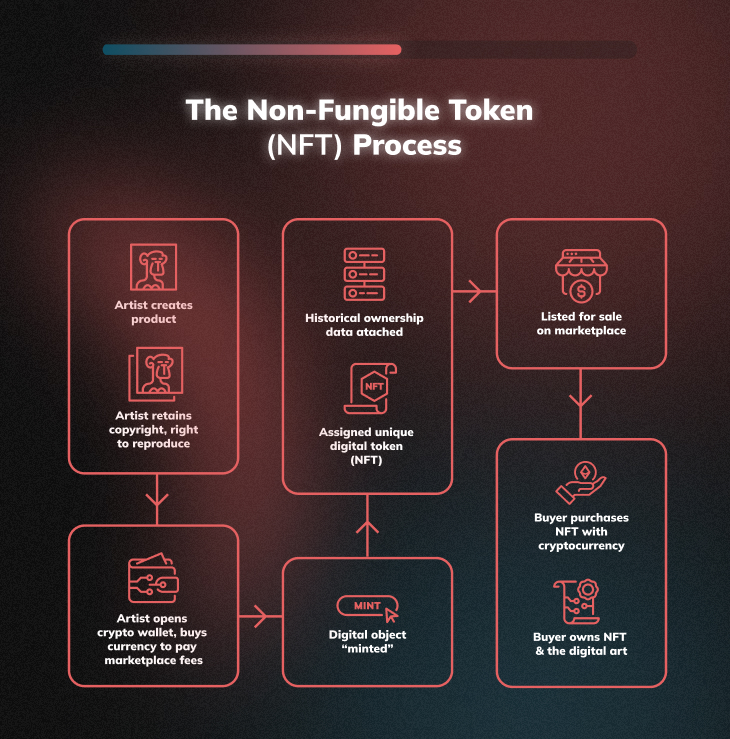
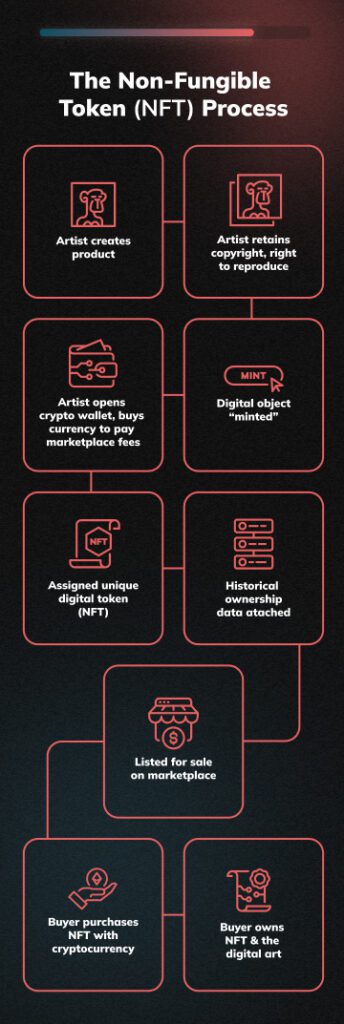
One of the key qualities of NFTs is their decentralized nature, which means they are not controlled by any central authority or institution. NFT transactions are transparent, as they are recorded on a public blockchain that enables anyone to track ownership and transaction history. Additionally, NFTs are often encrypted, providing an additional layer of security to the ownership and authenticity of the underlying asset. The unique qualities of NFTs have led to their popularity among creators and collectors, as they provide a means of rightfully owning and exchanging digital art that were previously difficult to monetize or verify ownership of.
One of the most high-profile NFT sales to date was the digital artwork “Everydays: The First 5000 Days” by artist Beeple, which sold for a record-breaking $69.3 million at a Christie’s auction in March 2021. Other notable NFT sales include a tweet by Twitter CEO Jack Dorsey, which sold for $2.9 million, and a virtual house in the online game Decentraland, which sold for $2.4 million.
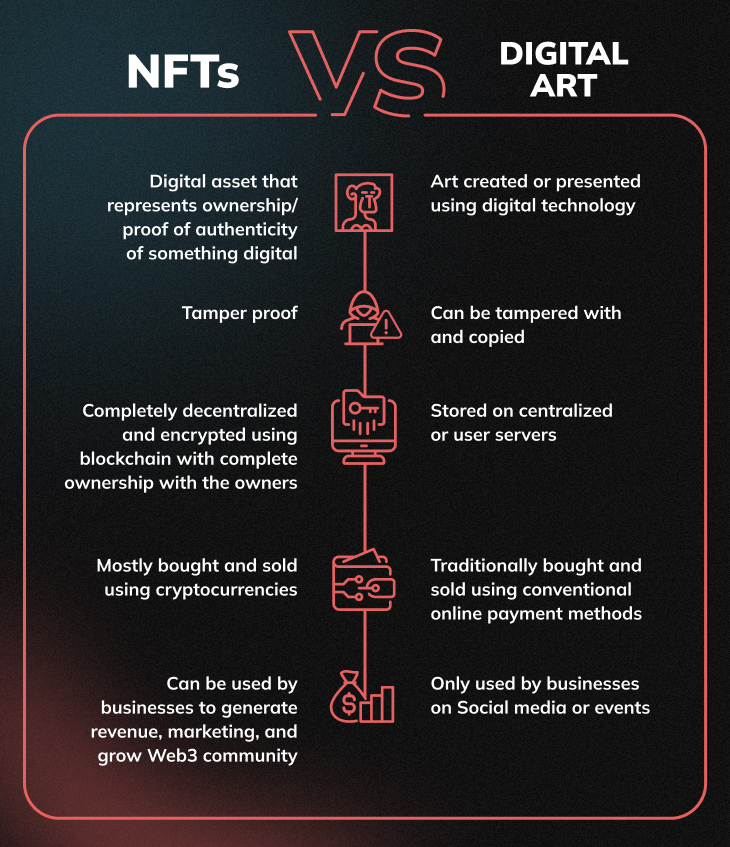
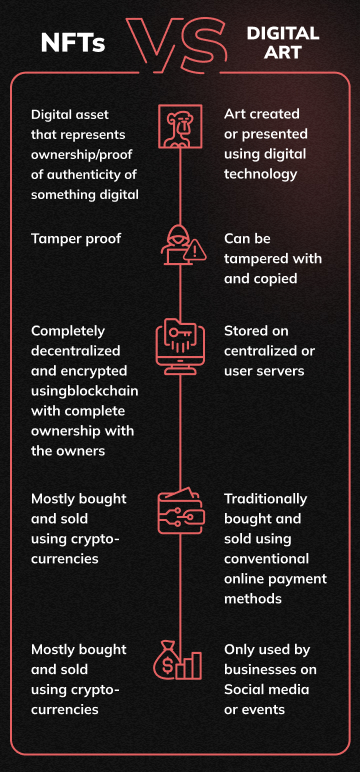
The use cases for NFTs extend far beyond the art world, with many industries exploring the potential of NFTs for business. For example, NFTs could be used to prove ownership of physical assets such as luxury goods or real estate or to track the authenticity and ownership of digital assets such as patents and copyrights. NFTs also have potential in the gaming industry, where they could be used to represent in-game assets and items.
This blog will guide you on how to use NFT in business and nowadays many companies are booming with more and more creative campaigns and approaches to implementing NFTs in their business models. We have favored some of the most impressive examples below in this guide as a bonus.
While NFTs were initially popularized in the art and music industries, they are now gaining traction in the business world as well. By leveraging the power of NFTs, businesses can create new revenue streams, stand out in a crowded marketplace, and reward customer engagement loyalty by offering unique opportunities. Using NFTs for your business creates a new way to monetize digital assets. In this article, we’ll explore in more detail why businesses should pay attention to NFTs and how they can benefit from this emerging technology.
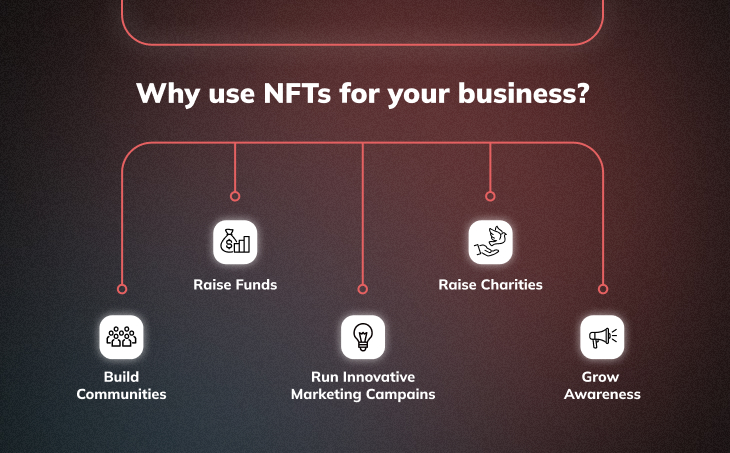
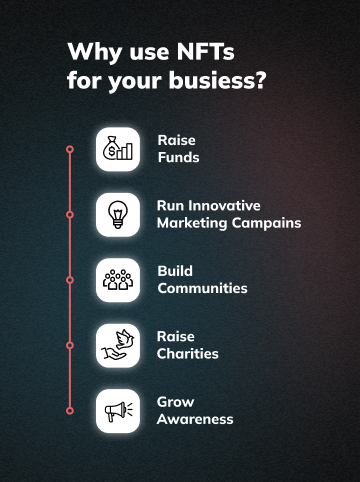
In the following sections, we have broken down the specific advantages and steps for implementing the NFT approach:
NFTs can be a powerful tool for growing brand awareness for businesses. By creating unique NFTs that showcase their brand and products, businesses can reach new audiences and build a stronger following. NFTs can be used to reward customer loyalty or build a community around the brand, which can create a sense of exclusivity and belonging. By creating one-of-a-kind NFTs that showcase their brand and products, businesses can generate buzz and attract attention from collectors, investors, and fans. What is more, as NFTs are used to protect a company’s intellectual property, this approach can help the company build trust with the customers and establish the brand as a leader in their industry.
A good example is Pizza Hut. The tasty brand launched a simple pizza slice as NFTs. The interesting part is that with each NFT, the collector receives an authentic Pizza Hut recipe, according to the NFT piece. The most expensive share is estimated at $8,824. Their next step is happing right now. The brand released The Pizzaverse through an AR app, continuing the Pizza story:
the pizzaverse is now open https://t.co/aLIeBoR3Il
— Pizza Hut (@pizzahut) June 1, 2022
Companies like Digital Artists work with global brands.
NFTs offer businesses a unique and trendy way to run marketing campaigns that capture the attention of consumers. By creating NFTs that are tied to your brand or products, an NFT for your businesses can leverage the growing popularity of NFTs to attract attention and engage with customers in a new way. Here are some examples of names creating a sense of exclusivity around their brand through NFTs:
In 2021, the fast-food chain released a series of NFTs that were tied to their new menu items. Each NFT featured a 3D animation of the menu item, along with sound effects and music. The NFTs were sold on the blockchain marketplace, Rarible, and were priced between $1 and $5. By creating these unique and collectible NFTs, Taco Bell was able to create a buzz around their new menu items and engage with their customers in a new and exciting way.
/
Our Spicy Potato Soft Tacos can now live in your hearts, stomachs and digital wallets. https://t.co/IC8b45lmd9 pic.twitter.com/FJUcuwCuyy
— Taco Bell (@tacobell) March 8, 2021
Gucci has been making significant strides in the NFT space, launching several campaigns that have captured the attention of the fashion and art worlds.
In 2021, Gucci launched the “Aria” NFT campaign on the Arianee blockchain platform, which featured a series of 24 unique NFTs inspired by the brand’s history and iconic designs.
Later on, in 2022, Gucci launched its own metaverse, which includes an NFT marketplace where users can buy and sell digital assets. They also partnered with the digital art platform Art021 to launch “The Vault of Art Space”, a virtual exhibition featuring exclusive NFT artworks by a variety of artists. Among they latest projects, is “Supergucci” – a collection of NFTs inspired by the brand’s signature motifs and designs. The collection includes a variety of unique NFTs, including digital sneakers, bags, and other accessories. The NFTs were sold on the Arianee blockchain platform and were priced between $9 and $12.
In the first drop of #SUPERGUCCI NFTs, @superplastic’s #SuperJanky finds himself in ten different dreamscapes inspired by #GucciAria by #AlessandroMichele. Discover more on Vault’s Discord channel https://t.co/wEUMFP1c3G pic.twitter.com/yshQAx4I2E
— gucci (@gucci) February 1, 2022
By creating unique and collectible NFTs, businesses can attract attention and engage with their customers in new and exciting ways. Taco Bell and Gucci are just a few examples of brands that have leveraged the power of NFTs to create buzz around their products and generate revenue. With the growing popularity of NFTs, businesses of all sizes can explore this innovative marketing strategy to capture the attention of their target audience and take their brand to the next level.
Selling NFT collections is a relatively new way for businesses to raise funds. By creating unique and collectible NFTs that are tied to their brand or products, businesses can generate revenue from the sale of these digital assets. This strategy has become particularly popular in the art world, where artists are selling NFTs of their digital artwork for millions of dollars. However, it’s not just artists who can benefit from this trend – businesses in a variety of industries are starting to leverage NFTs to raise funds and engage with their audience in a new way. Here are some good examples:
In 2021, the NBA launched its own NFT platform, Top Shot, which allows users to buy, sell, and trade officially licensed NBA collectible highlights. Each highlight is sold as a unique NFT, and prices can range from a few dollars to thousands of dollars depending on the rarity of the highlight. In just a few months, Top Shot generated over $500 million in sales, demonstrating the potential for NFTs as a fundraising tool.
Burberry launched a collection of NFTs inspired by its iconic plaid pattern. The collection included three different NFTs and was sold on Mythical Games for $60 to $480. The sale generated over $200,000 in revenue, which was donated to charities supporting communities affected by the COVID-19 pandemic. By using NFTs to raise funds for charity, Burberry was able to engage with its audience and demonstrate its commitment to social responsibility. Check the collection here → This year we can stride in BURBERRY X BLANKOS BLOCK PARTY.
In conclusion, NFTs present an exciting opportunity for small businesses to raise funds and expand their operations. The success of large-scale NFT projects demonstrates the potential of this fundraising method, and small businesses can leverage NFT drops to access the growing Web3 community and reach new audiences.
As with every new thing, we know it can be a little frustrating to step into this entirely new domain and we understand you. Therefore, the team of Digital Artists is and will always be here to get you out of the tight spot and place your potential under the lights. Digital Artists specializes in actively assisting small businesses to build their own NFT collections and raise the proper funds, gaining the sales they need. Our wireframe is “Every business is unique”, so there is no “one fit for all” strategy. Rather, we choose to work closely with the brand and together with our extensive knowledge in the NFT industry, build a strategy with a ready-to-use action plan.
NFTs offer businesses a powerful tool for building strong and engaged communities around their brand or products. By creating unique and collectible NFTs, businesses can foster a sense of exclusivity and create a community of passionate fans and collectors. With the potential for high returns and the ability to reach a new and engaged audience, it’s no wonder that more and more businesses are exploring the use of NFTs to build strong communities. Savour these two great examples for NFT community building: the Alma Mater of the field and the latest but leading one:
The Cryptopunks community is known for being one of the most engaged and active communities in the NFT space. Here are some of the typical characteristics of the Cryptopunks community:
Overall, the Cryptopunks community is a passionate, creative, and collaborative group of collectors and enthusiasts who are dedicated to exploring the possibilities of NFTs and pushing the boundaries of what is possible in the digital art world.
VeeFriends is building its NFT community through various initiatives that focus on fostering collaboration, education, and support among its members.
VeeFriends also hosts regular events and workshops, such as the VeeCon conference, where members can connect with each other and learn from industry experts. They also offer mentorship programs and grants to support members’ projects and ideas.
In addition, VeeFriends has created a unique NFT ecosystem where members can purchase and trade NFTs that grant access to exclusive experiences, such as attending private dinners with Gary Vaynerchuk or participating in group coaching sessions.
Overall, VeeFriends’ approach to building their NFT community is centered around creating opportunities for members to connect, learn, and collaborate, while also providing exclusive experiences that add value to their membership.
In conclusion, NFTs are a powerful tool for businesses to build engaged and passionate communities around their brand or products. The Cryptopunks community is a prime example of a community that is passionate, collaborative, and creative, and they have been able to push the boundaries of what is possible with NFTs. Meanwhile, VeeFriends is taking a different approach, focusing on fostering collaboration, education, and support among its members, while also providing unique and exclusive experiences through their NFT ecosystem. By leveraging NFTs to build communities, businesses can create a sense of exclusivity, foster collaboration, and connect with their audience in new and exciting ways, ultimately driving growth and success for their business.
NFT fund charities are a new and innovative way to raise money for charitable causes through the use of non-fungible tokens. These initiatives leverage the popularity of NFTs to generate interest and support for various charitable organizations, while also providing NFT collectors with an opportunity to give back to society.
NFT fund charities typically involve the auctioning of unique or rare NFTs, with the proceeds going directly to the designated charity. These auctions can generate significant sums of money, which can be used to support a range of social causes, from providing clean water to impoverished communities to funding research for diseases. NFT fund charities have been successful in bringing together different communities, including crypto enthusiasts, art collectors, and philanthropists, to support a common goal. A good example is The Art Blocks Playground Initiative. This is a popular NFT platform launched by the Playground Initiative, which aims to raise funds for the St. Jude Children’s Research Hospital. The initiative involves the auctioning of unique NFTs created by various artists, with all proceeds going to the charity.
Licensing and registrations with NFTs are two important considerations for creators and buyers of NFTs. Licensing refers to the legal agreements that govern how an NFT can be used and distributed, while registrations refer to the process of formally registering an NFT with an organization or regulatory body.

Licensing is essential for NFT creators to ensure that their intellectual property rights are protected, while also providing clarity to buyers on what they can and cannot do with the NFT. There are various types of licenses available, such as exclusive, non-exclusive, and limited licenses, which dictate the level of control the creator has over the NFT.
Registrations, on the other hand, can help to establish the authenticity and ownership of an NFT, which is particularly important for high-value NFTs. Some organizations, such as the Winklevoss-led NFT regulatory body NFT NYC, are exploring the possibility of developing a formal registration system for NFTs.
To sum up, licensing and registrations are crucial considerations for anyone involved in the NFT space, and they can help to provide clarity and protection for creators and buyers alike.
When you get to the thought that there isn’t any other way on how to use NFT for your business, here come the Loyalty Programs. NFT loyalty programs are a new and innovative way for brands and businesses to reward and incentivize their customers using non-fungible tokens. These programs typically involve the creation of unique NFTs that customers can earn through specific actions or behaviors, such as making a purchase or referring a friend. The NFTs can then be redeemed for exclusive rewards, such as discounts, merchandise, or access to special events.

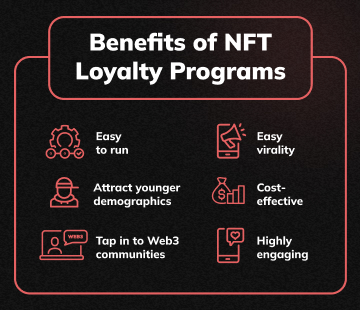
One recent example of an NFT loyalty program is the NBA’s Top Shot Moments Rewards program, which allows users to earn exclusive NFTs by completing various challenges, such as collecting a specific number of moments or completing a set of moments.
Another example is the Axie Infinity Scholarship Program, where players can earn NFTs by participating in the game and using them to pay for tuition to attend Axie Infinity’s play-to-earn program.
The NFT loyalty programs have the potential to provide brands and businesses with a unique and engaging way to build customer loyalty and incentivize specific behaviors, while also providing customers with exclusive and valuable rewards.
As you witnessed, Businesses can use NFTs in a variety of ways to engage with their customers and enhance their marketing strategies. And yet, lets sum up:
One way, of course, is by creating unique and collectible NFTs that represent their brand or products, which can then be sold or given away to customers as promotional items. This can help to create a sense of exclusivity and reward customer loyalty. NFTs can also be used to create new revenue streams by auctioning off limited edition NFTs or by selling digital assets as NFTs. Additionally, businesses can use NFTs to track the ownership and authenticity of physical goods, such as luxury items or artwork, by creating a digital record of ownership on the blockchain.
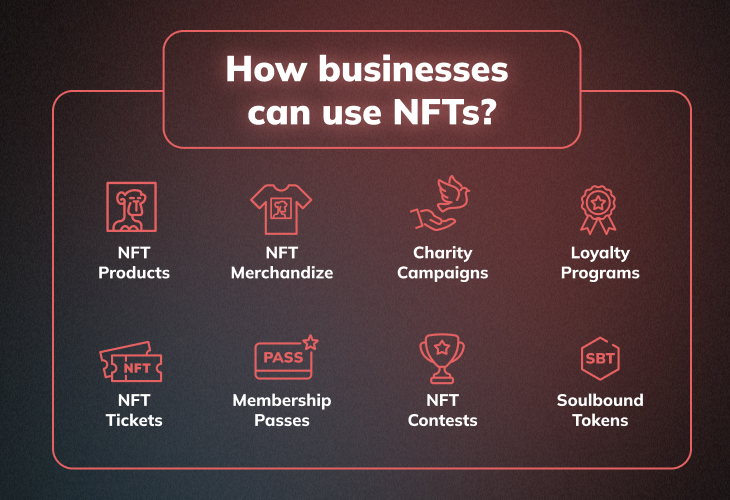
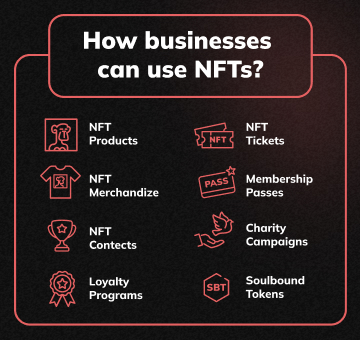
Finally, NFTs can be used to create new types of experiences or gamification opportunities, such as using NFTs as tickets to exclusive events or as rewards for completing certain actions or behaviors. Down the rabbit hole here, you can follow a nice lineup of what you can do in your NFT brand:
Dropping your own NFT collections involves creating and releasing your own unique NFTs. This process typically involves designing and minting the NFTs, determining the distribution and pricing strategy, and marketing the collection to potential buyers. By dropping your own NFT collection, you have full creative control over the design and distribution of the NFTs, allowing you to create a unique and exclusive offering for collectors. However, it is important to consider the competitive landscape and ensure that your collection offers something truly unique and valuable to potential buyers.
What is the wisest first approach to creating NFTs for small businesses? Creating NFT avatars! It involves designing and minting unique non-fungible tokens that represent digital personas or characters. NFT avatars can be used in a variety of applications, such as gaming, social media, or virtual reality. By creating NFT avatars, individuals and businesses can offer a new level of personalization and exclusivity to their customers and users.
Selling NFT versions of a brand product is an innovative way for businesses to offer their customers a unique and exclusive digital collectible that represents the physical product. This involves creating an NFT that features a digital representation of the product, along with any accompanying metadata or information about the product. The NFT can then be sold to collectors and fans of the brand, offering them a new way to engage with and own a piece of the brand’s history. NFTs can also be used to offer additional benefits to customers who purchase the physical product, such as access to exclusive content or experiences.
RTFKT, together with Nike CryptoKicks, introduce the future of Sneakers, powered by Skin Vial tech
— RTFKT (@RTFKT) April 22, 2022
Welcome to 2052 : 🌐👟🧪 pic.twitter.com/7449L79Bf4
By offering NFT versions of their products, brands can tap into the growing market for digital collectibles and provide their customers with a new and innovative way to engage with their products and brand.
Another great approach in this field is creating exclusive FTs for top fans. This is a way for businesses to reward and incentivize their most dedicated customers or followers. This involves designing and minting unique NFTs that can only be earned or purchased by those who have achieved a certain level of engagement or loyalty with the brand.
These NFTs can represent anything from exclusive content, merchandise, or experiences, and can be used to create a sense of exclusivity and value for those who have earned them.
And here are also some good examples of non-physical businesses that has created exclusive NFTs for top fans is:
The rock band Kings of Leon released three different types of NFTs as part of their album release campaign.
The social media platform launched “TikTok Top Moments, Own The Moment” a selection of six culturally significant TikTok videos from some of their most beloved creators and influencers.
Following the model for your business, you can enhance your customer loyalty programs and offer a new and innovative way for customers to engage with and promote your brand.
Digital identity is a critical component of our online lives, and Soulbound NFT tokens are a new and innovative way to create and manage digital identity. Unlike traditional identity management systems that rely on centralized databases, Soulbound NFT tokens are unique and verifiable digital assets that are stored on the blockchain. This means that they are tamper-proof and cannot be forged or duplicated.
Soulbound NFT tokens can be used to represent a wide range of digital identities, such as social media profiles, gaming avatars, or digital collectibles, and can be linked to real-world identities through identity verification processes. By using Soulbound NFT tokens for digital identity management, individuals and businesses can enhance the security, privacy, and ownership of their digital assets.
Is it possible to use NFT for small businesses? Absolutely! Digital merchandises are a new type of digital asset that can be bought, sold, and traded online and are perfect for small companies as well. These digital assets can take many forms, such as digital artwork, music, videos, and other digital content.
Using NFTs to d to represent digital merchandise, provides a new level of ownership and authenticity to digital content. Businesses can use NFTs to offer unique and limited-edition digital merchandise to their customers, creating a new market for digital collectibles. Digital merchandise can be sold on online marketplaces, such as OpenSea or Nifty Gateway, and can be purchased using cryptocurrencies or fiat currencies.
A good example of a business using NFTs for digital merchandise is the musician Grimes, who sold a collection of digital art and music as NFTs for a total of $6 million.
NFTs can be used to run contests and promotions. Businesses can design and mint unique NFTs that serve as prizes for winners of the contest or promotion, creating a sense of exclusivity and value for the participants. NFT-based contests can be run on online marketplaces, social media platforms, or other digital channels, and can be promoted through various marketing channels.
One recent example of an NFT contest is the “NFT Summer” campaign by the decentralized finance (DeFi) platform Aave. The campaign involved several challenges, including depositing and borrowing cryptocurrency on their platform, participating in social media challenges, and completing various other tasks related to DeFi.
Participants who completed the challenges were eligible to win unique NFTs, including a series of “Aavegotchi” digital pets that can be used in various blockchain-based games. The campaign generated a lot of interest among the DeFi community, with thousands of participants competing for the NFT prizes.
This is just one example of how NFTs can be used to create engaging and interactive contests, providing a new and innovative way for businesses to engage with their customers and fans.
Club memberships with NFT passes are becoming part of today’s world and it’s even more exciting than it sounds.
NFT passes can be used to represent memberships, providing a new level of ownership and authenticity to club memberships. By using NFT passes, businesses can offer unique and limited-edition memberships to their most loyal customers, providing a sense of VIP value. NFT passes can be minted on blockchain platforms and can be transferred between users, allowing members to trade or sell their memberships to others.
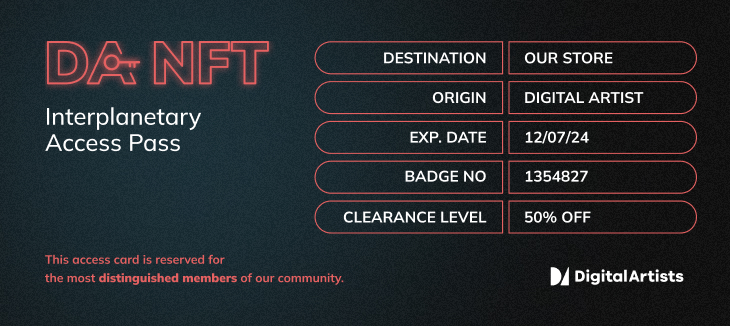
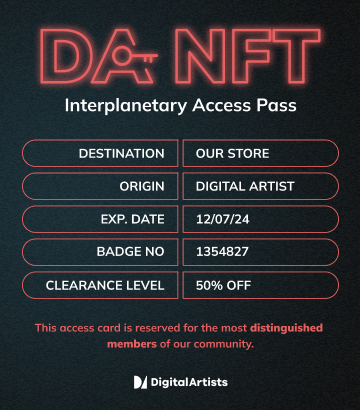
The top-ranking brand regarding club memberships and NFT Passes in 2023 is the Proof Collective. This pass is a collection of 1,000 exclusive membership pass NFTs on the Ethereum blockchain. PROOF Collective as a whole was founded by serial entrepreneur Kevin Rose- a host of the PROOF Podcast which provides in-depth NFT coverage and interviews. Holders of a PROOF Collective Pass NFT are able to access exclusive channels within the private PROOF Discord, together with early access to PROOF Podcast episodes.
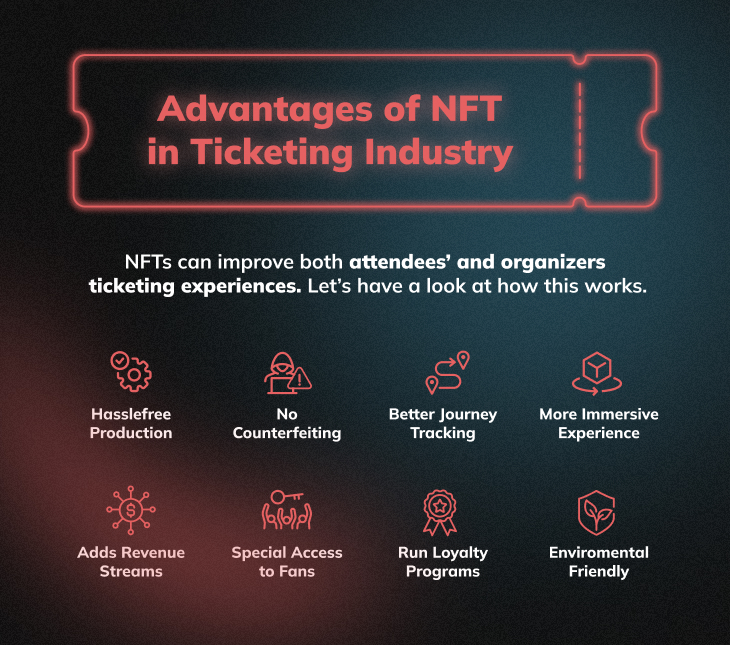
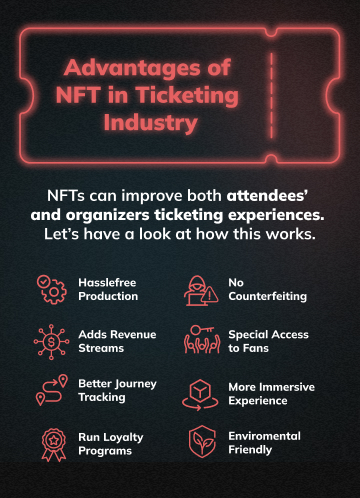
NFT tickets for events are the new wave that is taking the world by storm! This revolutionary concept is bringing a new level of excitement and engagement to event organizers and attendees alike. By using blockchain technology, NFT tickets provide a more secure and transparent ticketing system that ensures fair access to events and reduces the risk of fraud.
But that’s not all – NFT tickets offer a range of benefits for attendees, from providing a more engaging and personalized experience to exclusive access to VIP areas, merchandise, and other perks. Imagine attending an event with a unique digital asset that can be customized with unique designs, animations, and other interactive features. It’s like having a personal pass to the most exclusive events in the world!
The leading names leaning entirely on the wide range of possibilities that NFT Tickets can offer are Coachella, GaryVee, Kings of Leon, Maroon 5, EXIT Festival, and many more big names!
What is also worth focusing on are the platforms that offer NFT ticketing. Among the leading are: YellowHeartNFT, GUTS, Wicket, NFT TiX, and SeatLab.
We suggest you get ready to ride the NFT ticketing wave and experience a whole new level of excitement and engagement in the event space!
In conclusion, NFTs represent a groundbreaking development in the world of digital assets and ownership. As we’ve seen throughout this guide, NFTs offer businesses a range of exciting possibilities, from creating new revenue streams to fostering stronger relationships with customers. By leveraging the unique properties of blockchain technology and smart contracts, companies can use NFTs to unlock new forms of value and creativity and to engage with audiences in innovative ways.
Whether you’re a creative professional looking to monetize your work, a brand looking to build deeper connections with customers, or a business looking to explore new revenue streams, NFTs offer an exciting and powerful new tool for achieving your goals. By staying informed and keeping an open mind about this rapidly-evolving technology, businesses can position themselves to succeed in the digital economy of the future.
It is never too late to launch your NFT brand!
If you still have a question on how to use NFT in business, you can find it in our FAQs section!
NFTs’ uniqueness lies in blockchain tech that ensures transparent and tamper-proof verification of ownership and authenticity. Unlike digital assets that can be duplicated and shared, NFTs are one-of-a-kind and traceable to their creator, making them especially valuable for businesses with unique assets such as artists, musicians, and sports teams.
NFTs enable businesses to monetize their digital assets, creating new revenue streams by selling unique and exclusive content. NFTs can also offer new business models such as selling fractional ownership or creating a secondary market. However, businesses must price and distribute their NFTs carefully to maximize profits and offer value to customers.
NFTs have legal and regulatory concerns, including copyright and trademark laws for selling copyrighted/trademarked content and securities laws for selling NFTs as investments. Businesses should seek legal advice and keep up-to-date on regulations to ensure the responsible and compliant use of NFTs.
NFTs are stored on the blockchain, which is designed to be secure and tamper-proof. However, businesses still need to take precautions to protect their NFTs from hacks and theft. This can include using secure wallets and storage solutions, implementing strong authentication protocols, and monitoring for suspicious activity. It’s also important for businesses to have a plan in place for what to do in the event of a security breach.
NFTs have potential drawbacks for businesses, including the energy consumption of blockchain tech and backlash from environmentally-conscious customers. The hype surrounding NFTs may also create a bubble that could leave businesses and investors with worthless assets. It’s vital for businesses to be aware of the potential benefits and risks of NFTs to make informed decisions.